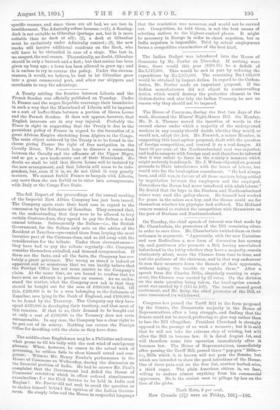The full Report of the proceedings of the annual meeting
cf the Imperial East Africa Company has just been issued. The Company again state their hard case in regard to the concession by the Sultanate of Zanzibar. They contend that, on the understanding that they were to be allowed to levy certain Customs-dues, they agreed to pay the Sultan a fixed annual tribute. Subsequently the Sultan—i.e., the British 'Government, for the Sultan only acts on the advice of the Resident at Zanzibar—prevented them from levying the most lucrative part of the Customs-dues, and so did away with the 'consideration for the tribute. Under these circumstances— they have had to pay the tribute regularly—the Company consider themselves swindled, and demand compensation. If these are the facts, and all the facts, the Company has cer- tainly a great grievance. The wrong as stated is indeed so apparent and so monstrous that we can hardly believe that the Foreign Office has not some answer to the Company's 'claim. At the same time, we are bound to confess that we irave seen no attempt to produce an answer. As we under- stand the matter, what the Company now ask is that they should be bought out for the sum of £300,000 in full. Of this, £200,000 is to be a sum belonging to the Sultanate of Zanzibar, now lying in the Bank of England, and £100,000 is to be found by the Treasury. The Company say they have spent £430,000 in developing their territory, and that most of this remains. If that is so, their demand to be bought out at only a cost of 4e100,000 to the Treasury does not seem unreasonable. In any case, the Company has a clear right to be put out of its misery. Nothing can excuse the Foreign Office for dawdling with the claim as they have done.


































 Previous page
Previous page